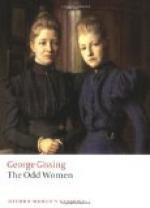’After all, there must be some one to teach children to read and write.’
’Yes; but people who are thoroughly well trained for the task, and who take a pleasure in it. This lady may be an exception; but I picture her as having spent a lifetime of uncongenial toil, longing miserably for the day when poor Mr. Micklethwaite was able to offer her a home. That’s the ordinary teacher-woman, and we must abolish her altogether.’
‘How are you to do that?’ inquired Everard suavely. ’The average man labours that he may be able to marry, and the average woman certainly has the same end in view. Are female teachers to be vowed to celibacy?’
’Nothing of the kind. But girls are to be brought up to a calling in life, just as men are. It’s because they have no calling that, when need comes, they all offer themselves as teachers. They undertake one of the most difficult and arduous pursuits as if it were as simple as washing up dishes. We can’t earn money in any other way, but we can teach children! A man only becomes a schoolmaster or tutor when he has gone through laborious preparation—anything but wise or adequate, of course, but still conscious preparation; and only a very few men, comparatively, choose that line of work. Women must have just as wide a choice.’
’That’s plausible, cousin Mary. But remember that when a man chooses his calling he chooses it for life. A girl cannot but remember that if she marries her calling at once changes. The old business is thrown aside—henceforth profitless.’
’No. Not henceforth profitless! There’s the very point I insist upon. So far is it from profitless, that it has made her a wholly different woman from what she would otherwise have been. Instead of a moping, mawkish creature, with—in most instances—a very unhealthy mind, she is a complete human being. She stands on an equality with the man. He can’t despise her as he now does.’
‘Very good,’ assented Everard, observing Miss Nunn’s satisfied smile. ’I like that view very much. But what about the great number of girls who are claimed by domestic duties? Do you abandon them, with a helpless sigh, to be moping and mawkish and unhealthy?’
’In the first place, there needn’t be a great number of unmarried women claimed by such duties. Most of those you are thinking of are not fulfilling a duty at all; they are only pottering about the house, because they have nothing better to do. And when the whole course of female education is altered; when girls are trained as a matter of course to some definite pursuit; then those who really are obliged to remain at home will do their duty there in quite a different spirit. Home work will be their serious business, instead of a disagreeable drudgery, or a way of getting through the time till marriage offers. I would have no girl, however wealthy her parent, grow up without a profession. There should be no such thing as a class of females vulgarized by the necessity of finding daily amusement.’




